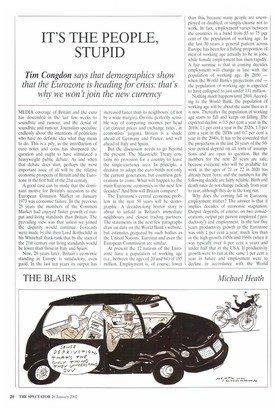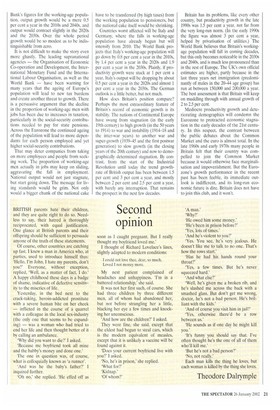IT'S THE PEOPLE, STUPID
Tim Congdon says that demographics show
that the Eurozone is heading for crisis: that's why we won't join the new currency
MEDIA coverage of Britain and the euro has descended in the last few weeks to soundbite and rumour, and the denial of soundbite and rumour. Journalists speculate endlessly about the intentions of politicians who have no definite idea what they mean to do. This is a pity, as the introduction of euro notes and coins has sharpened the question and ought to have stimulated a heavyweight public debate. As and when that debate does start, perhaps the most important issue of all will be the relative economic prospects of Britain and the Eurozone in the first half of the 21st century.
A good case can be made that the dominant motive for Britain's accession to the European Common Market in January 1973 was economic failure. In the previous 25 years the members of the Common Market had enjoyed faster growth of output and living standards than Britain. The prevailing view was that unless we joined the disparity would continue. Forecasts were made by the then Lord Rothschild in his Whitehall think-tank that by the start of the 21st century our living standards would be lower than those in Italy and Spain.
Now, 28 years later, Britain's economic standing in Europe is satisfactory, even good. In the last ten years its output has increased faster than its neighbours' (if not by a wide margin). On one perfectly sensible way of comparing incomes per head (at current prices and exchange rates', in economists' jargon), Britain is a shade ahead of Germany and France, and well ahead of Italy and Spain.
But the discussion needs to go beyond the present. The Maastricht Treaty contains no provision for a country to leave the single-currency area. In principle, a decision to adopt the euro binds not only the current generation, but countless generations to come. What will happen to the main Eurozone economies in the next few decades? And how will Britain compare?
The Eurozone's central economic problem in the next 50 years will be demographic. A decades-long horror story is about to unfold in Britain's immediate neighbours and closest trading partners. The statements in the next few paragraphs draw on data on the World Bank's website, but estimates prepared by such bodies as the United Nations. Eurostat and even the European Commission are similar.
At present the 12 nations of the Eurozone have a population of working age (i.e., between the ages of 20 and 64) of 185 million. Employment is, of course, lower
than this, because many people are unemployed or disabled, or simply choose not to work. In fact. employment varies between the countries in a band from 55 to 75 per cent of the population of working age. In the last 30 years a general pattern across Europe has been for a falling proportion of men of working age actually to be in jobs, while female employment has risen rapidly. A fair surmise is that in coming decades employment will change in line with the population of working age. By 2050 — when the World Bank's projections end — the population of working age is expected to have collapsed to just under 131 million.
Nothing much happens until 2010. According to the World Bank, the population of working age will be about the same then as it is now. Thereafter the population of working age starts to fall and keeps on falling. The expected decline is 0.5 per cent a year in the 2010s, 1.1 per cent a year in the 2020s, 1.3 per cent a year in the 2030s and 0.7 per cent a year in the 2040s. It has to be conceded that the projections in the last 20 years of the 50year period depend on all sorts of assumptions and are open to question. But the numbers for the next 20 years are safe, because everyone who will be available for work at the ages of 21 or 22 in 2020 has already been born, and the numbers for the following decade are fairly reliable. Birth and death rates do not change radically from year to year, although they do in the long run.
Why does the coming fall in Eurozone employment matter? The answer is that it implies decades of economic stagnation. Output depends, of course, on two considerations: output per person employed (productivity') and employment. In the last five years productivity growth in the Eurozone was only 1 per cent a year, much less than in the high-growth 1950s and 1960s (when it was typically over 4 per cent a year) and under half that in the USA. If productivity growth were to run at the same 1 per cent a year in future and employment were to decline in accordance with the World
Bank's figures for the working-age population, output growth would be a mere 0.5 per cent a year in the 2010s and 2040s. and output would contract slightly in the 2020s and the 2030s. Over the whole period growth would be so modest as to be indistinguishable from zero.
It is not difficult to make the story even more ghastly. The leading supranational agencies — the Organisation of Economic Co-operation and Development, the International Monetary Fund and the International Labour Organisation, as well as the World Bank — have been warning for many years that the ageing of Europe's population will lead to new tax burdens and create another threat to growth. There is a persuasive argument that the decline in the proportion of working-age men with jobs has been due to increases in taxation, particularly in the social-security contributions needed to pay for state pensions. Across the Eurozone the continued ageing of the population will lead to more dependants for each person employed and yet higher social-security contributions.
That may deter companies from taking on more employees and people from seeking work, The proportion of working-age men actually in jobs may keep on sliding, aggravating the fall in employment. National output would not just stagnate, but start going down. The message for living standards would be grim. Not only would a bigger chunk of the national cake have to be transferred (by high taxes) from the working population to pensioners, but the national cake itself would be shrinking.
Countries worst affected will be Italy and Germany, where the falls in working-age population have already begun but will intensify from 2010. The World Bank projects that Italy's working-age population will go down by 0.8 per cent a year in the 2010s, by 1.4 per cent a year in the 2020s and 1.9 per cent a year in the 2030s. Plainly, if productivity growth were stuck at 1 per cent a year, Italy's output will be dropping by about 0.5 per cent a year in the 2020s and almost 1 per cent a year in the 2030s. The German outlook is a little better, but not much.
How does Britain's position compare? Perhaps the most extraordinary feature of Britain's record of economic growth is its stability. The nations of Continental Europe have swung from stagnation (in the early 19th century) to high growth (in the 50 years to 1914) to war and instability (1914-18 and the inter-war years) to another war and super-growth (1939-45 and the first postwar generation) to slow growth (in the closing years of the 20th century) and now to demographically determined stagnation. By contrast, from the start of the Industrial Revolution until today the trend growthrate of British output has been between 1.5 per cent and 3 per cent a year, and mostly between 2 per cent and 2,5 per cent a year, with barely any interruption. That remains the prospect in the next few decades. Britain has its problems, like every other country, but productivity growth in the late 1990s was 1.5 per cent a year, not far from the very long-run norm. (In the early 1990s the figure was almost 3 per cent a year, helped by privatisation of utilities.) The World Bank believes that Britain's workingage population will fall in coming decades, but this only becomes noticeable in the 2030s and 2040s, and is much less pronounced than in the rest of Europe. The UK's own official estimates are higher, partly because in the last three years net immigration (predominantly of males in the 20-44 age group) has run at between 150,000 and 200,000 a year. The best assessment is that Britain will keep on muddling through with annual growth of 2 to 2,5 per cent.
Mediocre productivity growth and deteriorating demographics will condemn the Eurozone to protracted economic stagnation in the early decades of the 21st century. In this respect, the contrast between the public debates about the Common Market and the euro is almost total. In the late 1960s and early 1970s many people in Britain felt that their country was compelled to join the Common Market because it would otherwise face marginalisation and impoverishment. But the Eurozone's growth performance in the recent past has been feeble, its immediate outlook is indifferent, and its long-run economic future is dire. Britain does not have to join this club, and it won't.



















































































 Previous page
Previous page